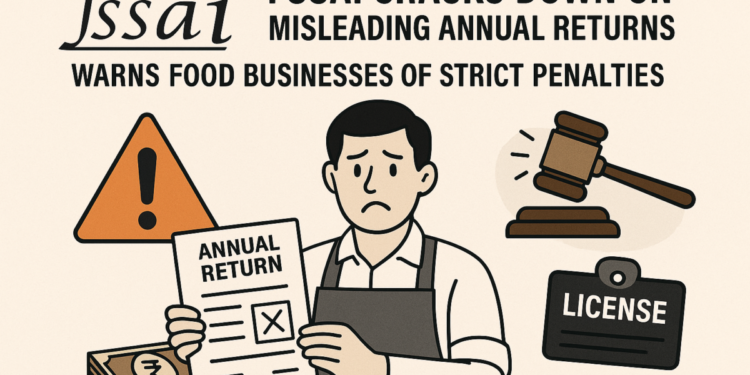-KH News Desk
New Delhi, India – In a clear signal of intensified regulatory oversight, the Food Safety and Standards Authority of India (FSSAI) has issued a stern warning to Food Business Operators (FBOs) across the country: file accurate and truthful annual returns, or face severe penalties.. The food regulator emphasized that providing false or misleading information in these mandatory submissions could lead to significant legal repercussions under the stringent provisions of the Food Safety and Standards Act,..

This directive underscores the FSSAI’s unwavering commitment to ensuring transparency and data integrity throughout India’s vast and complex food ecosystem. The regulator highlighted that accurate data is paramount for effective monitoring, risk assessment, and ultimately, safeguarding public health.
The Mandate for Accuracy and Compliance
The FSSAI’s emphasis on accurate annual returns is part of a broader push to strengthen food safety and hygiene practices across the entire supply chain. Annual returns provide the FSSAI with crucial insights into the operations, production volumes, and compliance status of food businesses. Any inaccuracies can compromise the regulator’s ability to identify potential risks, allocate resources effectively, and enforce standards uniformly.
To facilitate compliance and encourage businesses to rectify any past errors, the FSSAI has also provided a mechanism for FBOs to revise previously submitted data.. This proactive step allows businesses to correct discrepancies and ensure their records align with operational realities, thereby avoiding punitive actions. The regulator stressed that timely corrections are essential to prevent penalties, indicating a dual approach of strict enforcement combined with opportunities for businesses to self-correct.
Broader Regulatory Scrutiny
This warning about annual returns is not an isolated incident but rather part of a series of recent actions by the FSSAI to tighten its grip on food safety and compliance across various segments of the industry.
- E-commerce Platforms Under Scrutiny: The FSSAI recently held a meeting with e-commerce platforms, warning them of “severe action” if they fail to comply with food safety protocols.. The regulator directed these platforms to share comprehensive data pertaining to their warehouses, food handlers, and other relevant information on the FoSCoS (Food Safety Compliance System) portal to ensure transparency.. They were also instructed to prominently display their FSSAI license number on every receipt, invoice, and cash memo provided to consumers.. This move came after quick commerce platforms faced scrutiny over food safety violations, leading to the temporary suspension of licenses for some dark stores..
- Front-of-Pack Labelling (FOPL):The FSSAI is actively working on implementing stringent front-of-pack labelling regulations, which aim to introduce pictorial warnings on packaged foods to inform consumers about potentially harmful ingredients like fats, salt, and sugar.. While the regulator recently sought a three-month extension from the Supreme Court to finalize these complex rules, the ongoing push highlights the commitment to consumer awareness and public health..
- Hygiene and Storage Guidelines: The FSSAI has also issued advisories on maintaining hygiene, particularly during the monsoon season. It recently suggested that households clean and defrost their refrigerators every two weeks to prevent bacterial growth and food spoilage.. These guidelines emphasize the importance of washing fruits and vegetables, cooking food thoroughly, refrigerating perishables below°C, and maintaining overall kitchen cleanliness and personal hygiene..
- Import Challenges: While not directly related to annual returns, the FSSAI’s stringent import clearance processes have also been a point of contention for food businesses. Delays and rejections of consignments, particularly refrigerated cargo, due to testing norms and procedural issues, have led to significant demurrage costs and supply chain disruptions for importers..
Impact on Food Business Operators
The FSSAI’s intensified focus on compliance means that FBOs must prioritize data accuracy and adhere strictly to regulatory requirements. The provision for revising submitted data offers a window for businesses to ensure their records are in order, but the underlying message is clear: the regulator is serious about enforcement. Businesses that fail to adapt to this stricter environment risk not only financial penalties but also reputational damage and operational disruptions.
Ultimately, the FSSAI’s actions are aimed at fostering a safer and more transparent food environment for Indian consumers. By demanding accurate data and enforcing compliance, the regulator seeks to build greater trust in the food industry and ensure that all products available in the market meet the highest safety and quality standards. This proactive stance is crucial for addressing public health concerns and promoting a culture of accountability across the entire food business landscape.







